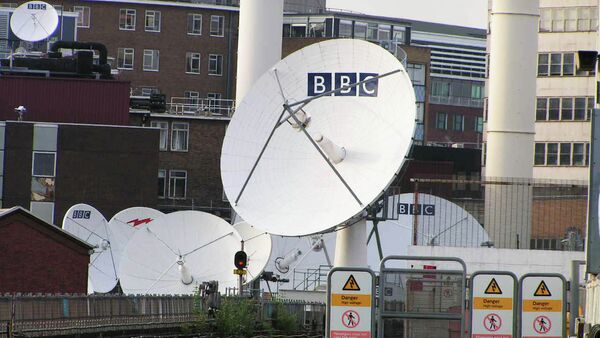As the ‘Five Eyes' nations — Australia, Canada, New Zealand, the UK and the US, that make up the world's leading intelligence-sharing network — met in London on January 22 amid calls to step up mass surveillance in the fight against terror, the importance of a little-known role of the BBC became clear.
Although much has been made of the allegations by ex-CIA contractor Edward Snowden — now living in temporary asylum for a second year in Moscow — about the mass surveillance carried out at the UK Government Communications HQ (GCHQ), BBC staff are increasingly being used to monitor social media sites and the internet for terrorist activity, which they then report back to the security services.
Is 'The Five Eyes Alliance' Conspiring to Spy on You?— Atlantic Mobile http://t.co/CXF9X5FIcJ pic.twitter.com/luo9L0faz2
— Sir Arnold Robinson (@uk_expat) June 26, 2013
The Five Eyes alliance — formed in the aftermath of World War II — is an agreement to share intelligence between the nations. Britain — for its part — relies upon intelligence from the GCHQ communications agency in Cheltenham, which analyses communication data, including emails, telephones and other electronic information.
Tune In and Stay Ahead
Yet it also relies on a specialist department of the BBC that was established 75 years ago to monitor and report on mass media around the globe. BBC Monitoring — based near Reading, west of London — is paid for out of the BBC licence fee, but reports mostly to the Foreign Office and is overseen by the Cabinet Office.
Its main role for years was to monitor shortwave broadcasts from all over the world, listening in to radio broadcasts as well as other sources, writing up reports and sending them to the Ministry of Defence or the Foreign Office.
In 2015, however, it is no longer funded by the government; it is paid for by the BBC licence fee, following the decision by British Prime Minister David Cameron's government to cut back the BBC, forcing the licence-payer to fund the £25 million monitoring operation. (The same agreement saw the Foreign office halt funding for BBC World Service, which is now also paid for by the British public).
Always interesting to see what BBC tv licence revenue is spent on. TVL contractor Capita spying and monitoring us. pic.twitter.com/L4QrzSp3Wf
— TV Licensing Watch (@tvlwatch) March 12, 2014
The BBC — whose motto is ‘Nation shall speak peace unto Nation' - runs the monitoring operation from a Victorian stately home in Caversham Park, near Reading, as well as a signals receiving operation at nearby at Crowsley Park in South Oxfordshire. From there, BBC staff monitor radio, TV, the internet and the press in over 150 countries in 70 languages. It employs around 370 people, based in the UK, Europe, Russia, the Caucasus, Central Asia, South Asia, the Middle East and Africa.
Their reports are used by various departments of the British Government, as well as third party sources, including commercial clients, media organizations, foreign governments, NGOs and universities.
The old funding arrangement — prior to 2013/14 — meant that BBC Monitoring was directly funded through the Foreign Office and answered to the Cabinet Office. However, its move to be funded directly by the TV licence fee — which pretty much everyone in the UK is forced to pay for — brings into question the organisation's impartiality.
Its own editorial guidelines state that: "Impartiality lies at the heart of public service and is the core of the BBC's commitment to its audiences. It applies to all our output and services — television, radio, online, and in our international services and commercial magazines. We must be inclusive, considering the broad perspective and ensuring the existence of a range of views is appropriately reflected."
Sputnik UK asked the BBC what is the role of BBC Monitoring now and whether it still ‘breaks’ news for the government. We also asked how relevant it is now and why the licence-fee payer should pay for it.
A spokesperson for BBC Monitoring told Sputnik UK: “BBC Monitoring compiles publicly available news, comment and reaction from the world’s press, radio, TV and the internet, translating over 100 languages into English and making its reports available to the rest of the BBC, and to commercial clients including governments, NGOs, and academics. BBC Monitoring has helped the BBC to produce some of its best journalism.
"BBC Monitoring‘s funding moved to the licence fee in 2013 as part of an agreement with the UK government. The agreement – known as ‘the scheme’ – is set to run to the end of the current Charter in 2016. It also states that the current agreement will be up for negotiation, including funding mechanisms, as part of the charter renewal process.”
Philosophical Failure
In May 2013, the Monitoring unit courted controversy when it was reported that more than £8.3million had been spent on a computer system called Socrates (Specialised, Open source, Collection, Re-versioning, Archiving, Tailored, Export, System) at BBC Monitoring to translate languages from audio into written English. The project — in association with software company Autonomy — was ended after five years of trials. A joint statement said: "The BBC and Autonomy have reached an amicable settlement to conclude the 2008 contract to provide an IT system to the BBC.".
As the Five Eyes Alliance — along with MI5, MI6 and GCHQ — call for more mass surveillance in the face of an onslaught of cyber-warfare, it is ironic that a small number of people within the BBC are sitting in a Victorian pile outside London, watching and reporting what's on the web.




